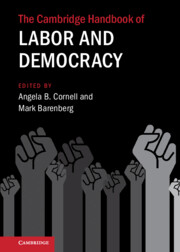Book contents
- The Cambridge Handbook of Labor and Democracy
- The Cambridge Handbook of Labor and Democracy
- Copyright page
- Contents
- Contributors
- Acknowledgments
- Introduction
- Part I Labor and Democracy: Theory and Practice
- Part II History, Politics, and Law
- Part III Labor, Diversity, and Democracy
- Part IV Country and Regional Perspectives
- Part V Labor and Democracy Sectoral Case Studies: Platform Workers, Higher Education, and the Care Industry
- 19 Pursuing Democratic Depth in an Age of Multinational Power and Soft Labor Law
- 20 Corporatization of Higher Education
- 21 The Fissured Welfare State
- Index
- References
20 - Corporatization of Higher Education
A Crisis of Labor and Democracy
from Part V - Labor and Democracy Sectoral Case Studies: Platform Workers, Higher Education, and the Care Industry
Published online by Cambridge University Press: 25 January 2022
- The Cambridge Handbook of Labor and Democracy
- The Cambridge Handbook of Labor and Democracy
- Copyright page
- Contents
- Contributors
- Acknowledgments
- Introduction
- Part I Labor and Democracy: Theory and Practice
- Part II History, Politics, and Law
- Part III Labor, Diversity, and Democracy
- Part IV Country and Regional Perspectives
- Part V Labor and Democracy Sectoral Case Studies: Platform Workers, Higher Education, and the Care Industry
- 19 Pursuing Democratic Depth in an Age of Multinational Power and Soft Labor Law
- 20 Corporatization of Higher Education
- 21 The Fissured Welfare State
- Index
- References
Summary
Concepts of labor and democracy have infused the theory and practice of higher education in the USA since the development of the modern university in the late 1800s and the early 1900s.Higher education’s social role in promoting the common good in a democratic society is linked to its internal labor model that provides faculty with academic freedom and collective self-governance. These are contested institutional goals and structures, however, in tension with the competing use of higher education to serve the private interests of industry. This chapter explores the ongoing push-pull between private economic interests, on the one hand, and higher education’s contribution to wider democratic political culture and its correlative internal commitment to its faculties’ academic freedom, tenure, and rights to govern jointly with administrators, on the other.
Keywords
- Type
- Chapter
- Information
- The Cambridge Handbook of Labor and Democracy , pp. 318 - 333Publisher: Cambridge University PressPrint publication year: 2022
References
- 1
- Cited by

